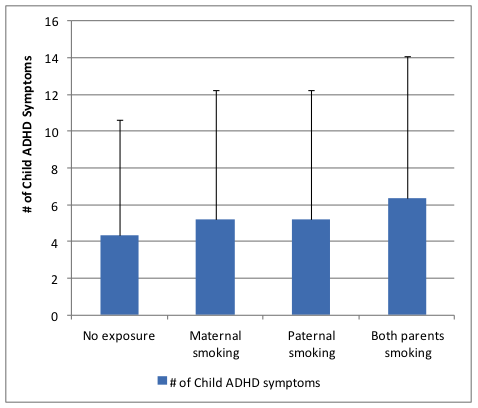Children whose mothers smoked during pregnancy are at higher risk for attention deficit hyperactivity disorder (ADHD) (see Langley, Rice, van den Bree, & Thapar, 2005 for a review). However, studies that examine prenatal exposure to substances and child outcomes often fail to account for other factors that might differ between families and account for those associations. In this week’s ASHES, as part of our Special Series on Fatherhood and Addiction, we review a study that examined whether the apparent association between prenatal exposure to nicotine and child ADHD can be explained in part by fathers’ smoking behaviors (Langley, Heron, Smith, & Thapar, 2012).
Methods
- Researchers analyzed data from a large longitudinal study (Golding, Pembrey, & Jones, 2001) that assessed 8,324 families in the United Kingdom from pregnancy through children’s late adolescent years.
- Measures used in the current study included:
- Whether and how much (i.e., cigarettes per day) mothers and fathers smoked during pregnancy;
- Child ADHD symptoms, as reported by parents at child age 7 (Development & Well-Being Assessment: Goodman, Ford, Richards, Gatward, & Meltzer, 2000);
- Demographic and other contributing factors, including ethnicity, education, parental occupation, maternal alcohol use, and child sex.
- The researchers examined associations between maternal and paternal smoking and child ADHD using group comparisons and linear regression models.
- They also analyzed the subset of families where the mothers did not smoke during pregnancy, to try to determine if paternal smoking during pregnancy could account for child ADHD in the absence of maternal smoking
Results
- As Figure 1 shows, children whose parents smoked during pregnancy had higher ADHD symptom counts at age 7 than children whose parents had not smoked.
- Regression analyses found that both maternal smoking and paternal smoking during pregnancy were associated uniquely with child ADHD symptoms, even when demographic and other contributing factors were included in the model.
- For children whose mothers did not smoke during pregnancy, those whose fathers smoked during pregnancy had higher ADHD symptom counts.
Figure 1: Child ADHD symptoms of children with different combinations of parental smoking during pregnancy. Adapted from Langley et al., 2012. Click image to enlarge.
Limitations
- Children in this sample had relatively low prevalence of ADHD (2.1%); therefore, there was not much variability in the ADHD symptom count outcome, making the detection of differences difficult.
- Parents reported on both their own smoking behavior and their children’s ADHD symptoms. It is possible that parents who smoke are more likely than others to report behavioral problems among their children, whether they exist or not.
Conclusion
The results suggest that the relationship between maternal smoking during pregnancy and child ADHD might not be due to actual pre-natal exposure effects. Instead, the observed association might be due to a combination of genetic and environmental factors, for which both mothers’ and fathers’ smoking serve as proxies. It is important to note that there are many studies, such as the one reviewed in the last ASHES, that do find evidence that maternal smoking during pregnancy likely has direct effects on the fetus, so this study should in no way be used to argue that mothers can smoke during pregnancy without doing harm to their babies. Instead, the study suggests that we ought to focus more attention on the entire family environment during pregnancy and childhood and potential risk factors that emerge for children who grow up in smoking households.
–Sarah Nelson
What do you think? Please use the comment link below to provide feedback on this article.
References
Golding, J., Pembrey, M., & Jones, R. (2001). ALSPAC–the Avon Longitudinal Study of Parents and Children. I. Study methodology. Paediatric and Perinatal Epidemiology, 15(1), 74-87.
Goodman, R., Ford, T., Richards, H., Gatward, R., & Meltzer, H. (2000). The Development and Well-Being Assessment: Description and initial validation of an integrated assessment of child and adolescent psychopathology. Journal of Child Psychology and Psychiatry, 41(5), 645-655.
Langley, K., Heron, J., Smith, G. D., & Thapar, A. (2012). Maternal and paternal smoking during pregnancy and risk of ADHD symptoms in offspring: testing for intrauterine effects. American Journal of Epidemiology, 176(3), 261-268. doi: 10.1093/aje/kwr510
Langley, K., Rice, F., van den Bree, M. B., & Thapar, A. (2005). Maternal smoking during pregnancy as an environmental risk factor for attention deficit hyperactivity disorder behaviour. A review. Minerva Pediatrica, 57(6), 359-371.





